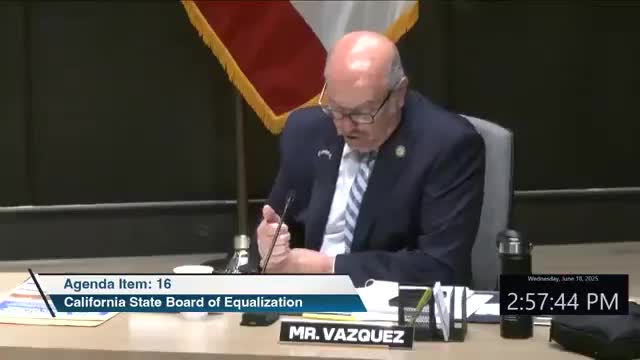Senate appoints Monique Limon as first Latina pro tem in California
June 21, 2025 | Board of Equalization, Other State Agencies, Executive, California
This article was created by AI summarizing key points discussed. AI makes mistakes, so for full details and context, please refer to the video of the full meeting. Please report any errors so we can fix them. Report an error »

In the heart of California's government, the Board of Equalization (BOE) convened on June 18, 2025, to discuss pressing legislative matters that could shape the state's future. As the afternoon session unfolded, members engaged in a thoughtful dialogue about various bills, particularly those related to housing and property tax administration.
One of the key discussions centered around a series of bills aimed at expediting housing availability. While these bills sparked interest among board members, it was clear that they fell outside the BOE's direct responsibilities. "They are of interest in expediting housing availability," one member noted, emphasizing that the agency's focus remains on property tax administration. The complexity of local capabilities and regulations was acknowledged, highlighting the intricate web of governance that influences housing development.
The conversation then shifted to the fate of several bills that had been moved into the suspense file. Questions arose about whether these bills would be reintroduced or deemed dead. Members discussed the possibility of these bills being classified as two-year bills, allowing for reconsideration in the next legislative session. "I can't give you a definitive answer today," one member admitted, reflecting the uncertainty that often accompanies legislative processes.
A notable moment during the meeting was the acknowledgment of a significant leadership change within the Senate. For the first time, a Latina, Monique Limon, has taken the role of Senate Pro Tem. This historic appointment was celebrated as a step forward in representation, marking a new chapter in California's political landscape.
As the meeting drew to a close, the board opened the floor for public comments, though none were received. The session wrapped up with members expressing gratitude for the discussions held, particularly regarding the impact of legislative decisions on communities across California.
In a state where housing and taxation are perennial issues, the BOE's discussions reflect the ongoing challenges and opportunities that lie ahead. As members prepare for future sessions, the implications of these legislative conversations will undoubtedly resonate throughout California's diverse communities.
One of the key discussions centered around a series of bills aimed at expediting housing availability. While these bills sparked interest among board members, it was clear that they fell outside the BOE's direct responsibilities. "They are of interest in expediting housing availability," one member noted, emphasizing that the agency's focus remains on property tax administration. The complexity of local capabilities and regulations was acknowledged, highlighting the intricate web of governance that influences housing development.
The conversation then shifted to the fate of several bills that had been moved into the suspense file. Questions arose about whether these bills would be reintroduced or deemed dead. Members discussed the possibility of these bills being classified as two-year bills, allowing for reconsideration in the next legislative session. "I can't give you a definitive answer today," one member admitted, reflecting the uncertainty that often accompanies legislative processes.
A notable moment during the meeting was the acknowledgment of a significant leadership change within the Senate. For the first time, a Latina, Monique Limon, has taken the role of Senate Pro Tem. This historic appointment was celebrated as a step forward in representation, marking a new chapter in California's political landscape.
As the meeting drew to a close, the board opened the floor for public comments, though none were received. The session wrapped up with members expressing gratitude for the discussions held, particularly regarding the impact of legislative decisions on communities across California.
In a state where housing and taxation are perennial issues, the BOE's discussions reflect the ongoing challenges and opportunities that lie ahead. As members prepare for future sessions, the implications of these legislative conversations will undoubtedly resonate throughout California's diverse communities.
View full meeting
This article is based on a recent meeting—watch the full video and explore the complete transcript for deeper insights into the discussion.
View full meeting
